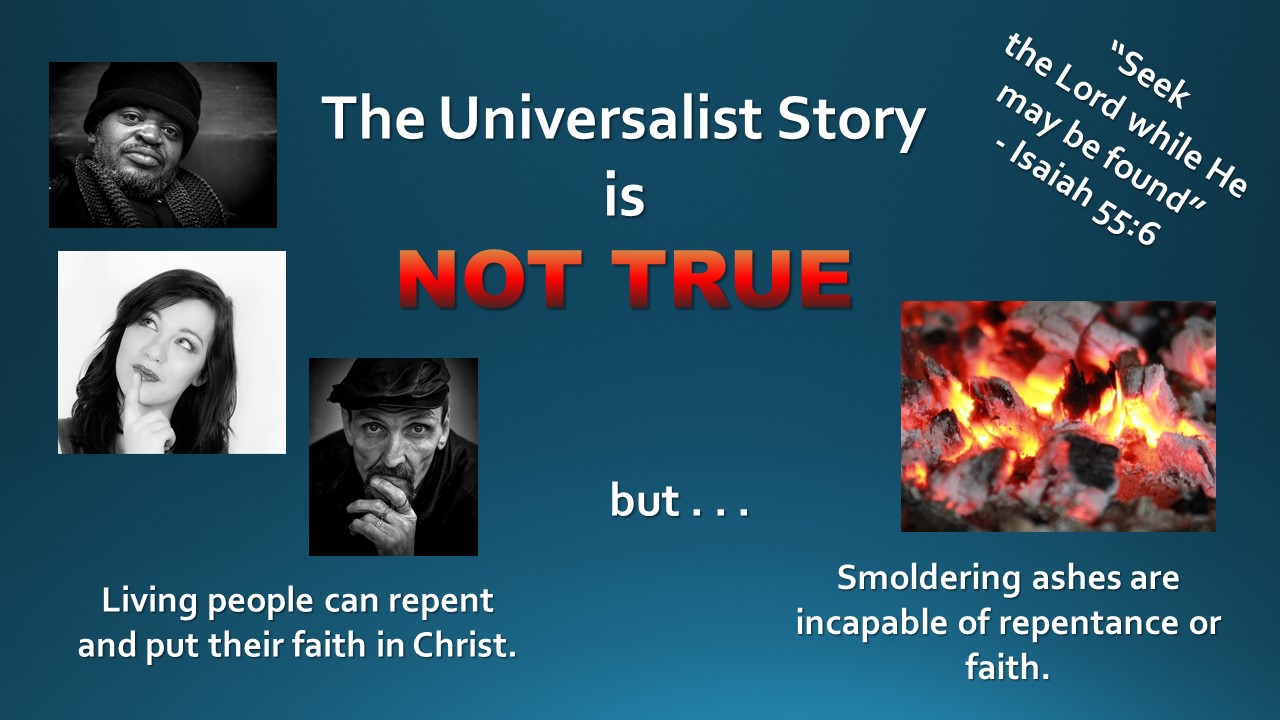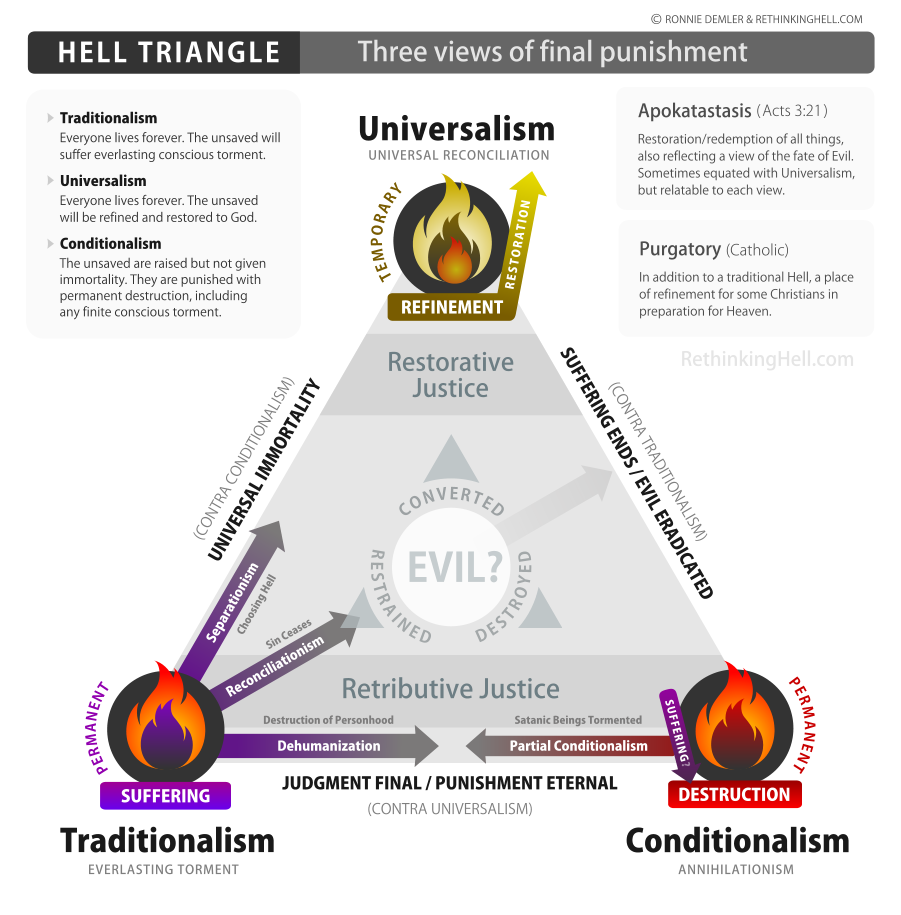- Jun 1, 2017
- 911
- 758
- 60
- Country
- United States
- Gender
- Male
- Faith
- Christian
- Marital Status
- Married

Ashes can’t repent. This is a big problem for the Universalist story.
I’m talking about the story which Christian Universalists promote. These Universalists are Christian in that they believe that the only way anyone can be saved is by God’s grace, and the only way His grace is experienced is through faith in Jesus Christ. Both the Bible and our experience tell us that many people die without placing their faith in Christ. Further, the Bible makes it quite clear that the unrighteous will be resurrected to face judgment and will be cast into hell. But the Universalist says there’s still hope for those people who have been cast into hell. God still wants them to be saved. They can still repent and put their faith in Jesus, and when they do, God will let them out of the lake of fire and welcome them into His presence. As long as we don’t look too carefully at what the Bible actually says, this story sounds good to some. This Universalist story has many problems. Among the biggest problems is this simple fact:
Ashes can’t repent. And the Bible tells us that people who are thrown into the lake of fire are burned to ashes.
There are a number of examples of God consuming people with fire in the Old Testament.
* In Leviticus we read about the tragic case of Nadab and Abihu, who, after disobeying the Lord’s command, are consumed by fire from the presence of the Lord. They die. (Leviticus 10:1-2)
* In Numbers we read of two cases of “fire from the Lord” consuming people in judgment (Numbers 11:1 and Numbers 16:35).
* The Lord sends down fire to consume soldiers sent to apprehend Elijah (2 Kings 1:10).
* The most famous judgment by fire occurs when God destroys Sodom and Gomorrah (Genesis 19:24-25). The people are not tormented by fire, they are destroyed by fire.
How do we know that something similar will happen to the unrighteous who are cast into hell? First, there is the fact that we would normally expect people thrown into a lake of fire to be burned to ashes. But far more importantly, the Apostle Peter, inspired by the Holy Spirit, tells us specifically and explicitly that what happened to the bodies of the people at Sodom and Gomorrah will happen to the unrighteous on the day of judgment. Peter specifically points out that they will be burned to ashes:
NIV 2 Peter 2:6 if he condemned the cities of Sodom and Gomorrah by burning them to ashes, and made them an example of what is going to happen to the ungodly;
Peter was not the first to tell us this. Isaiah, speaking of the final destinies of people, wrote in the last chapter of Isaiah:
Isaiah 66:16 For with fire and with his sword the LORD will execute judgment on all people, and many will be those slain by the LORD.
. . .
22 "As the new heavens and the new earth that I make will endure before me," declares the LORD, "so will your name and descendants endure.
23 From one New Moon to another and from one Sabbath to another, all mankind will come and bow down before me," says the LORD.
24 "And they will go out and look on the dead bodies of those who rebelled against me; the worms that eat them will not die, the fire that burns them will not be quenched, and they will be loathsome to all mankind."
Isaiah 66:24 is later quoted by Jesus to describe what will happen to people in hell (see Mark 9:47-48). Notice that the fire is not being used to torture living people, but to consume dead bodies.
Malachi refers to the same fate for the unrighteous:
Malachi 4:1 "Surely the day is coming; it will burn like a furnace. All the arrogant and every evildoer will be stubble, and the day that is coming will set them on fire," says the LORD Almighty. "Not a root or a branch will be left to them.
2 But for you who revere my name, the sun of righteousness will rise with healing in its rays. And you will go out and frolic like well-fed calves.
3 Then you will trample on the wicked; they will be ashes under the soles of your feet on the day when I act," says the LORD Almighty.
John the Baptist is another prophet who tells us that the unrighteous will be burned up:
Matthew 3:12 His winnowing fork is in his hand, and he will clear his threshing floor, gathering his wheat into the barn and burning up (katakaio) the chaff with unquenchable fire."
It’s worth noting that the word John the Baptist uses for “burning up” is katakaio. which consistently means to burn something completely with fire. To read more about katakaio, check out this blog post:
Downburned and Ashified, the Annihilation of the Unrighteous
Jesus uses this same word, katakaio, to also describe the final fate of the unrighteous:
Matthew 13:30 Let both grow together until the harvest. At that time I will tell the harvesters: First collect the weeds and tie them in bundles to be burned (katakaio); then gather the wheat and bring it into my barn.'"
Furthermore, the author of Hebrews warns of a “raging fire that will consume the enemies of God” (Hebrews 10:27).
How do Universalists respond to all this? They point out that fire can also be used to purify and they claim that it is the sins, or sinful nature, that is being burned up. That explanation would sound plausible until you read the actual words of the Bible. In 2 Peter 2:6, Isaiah 66:24, Malachi 4:3, and Matthew 13:30 (as interpreted by Jesus Himself a few verses later in Matthew 13:38), it is unrighteous people themselves, and not their deeds, which are burned up.
Some Universalists might try to claim that only the bodies and not the souls of the unrighteous are burned up. The problem with this is that Jesus tells us that the same thing will happen to both the bodies and souls of the unrighteous when they are cast into hell:
NIV Matthew 10:28 Do not be afraid of those who kill the body but cannot kill the soul. Rather, be afraid of the One who can destroy both soul and body in hell.
Conclusion
Universalists often focus on the “big story”. This is not in itself wrong. The Bible does present a big story. However, the Universalist version of the grand narrative of Scripture has many problems.
This post has been written so that it can be read on its own, but it is also the third in a series on problems with the Universalist story. In the first post I explained that their story has the wrong goal. In the second post, I explained that the Universalist story is not realistic because it fails to account for the biblical evidence that some will not love and trust God no matter what God does. After a certain point (which God only knows) giving them more time will not help them. In this post I have discussed the fact that the Universalist story involves people repenting while in the lake of fire. But there’s a problem:
Ashes can’t repent.
This post originally appeared on my blog, here.
a


